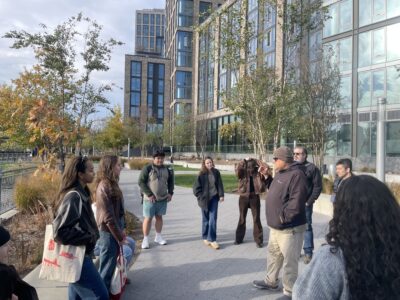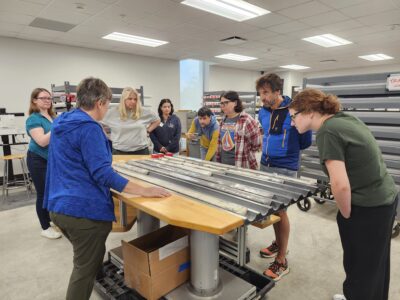
M.S. in Sustainability Management (MSSM) alum Uta Jungermann (’12) has had a varied array of professional experiences. Prior to joining the MSSM program, she had worked in the tourism industry as well as in finance. Upon completing the program last spring, Uta’s career path took her to Geneva, Switzerland, where she currently works for the World Business Council for Sustainable Development (WBCSD), a CEO-led organization of companies that galvanizes the global business community to create a sustainable future for business.
1. What is your current job?
Since June 2012, I have been working for the World Business Council for Sustainable Development (WBCSD) in Geneva, Switzerland. The WBCSD is a CEO-led organization of forward-thinking companies that galvanizes the global business community to create a sustainable future for business, society and the environment. Together with its 200 members, the council applies its respected thought leadership and effective advocacy to generate constructive solutions and take shared action.
Within the WBCSD, I am the project associate for the Forest Solutions Group (FSG). In a nutshell, this is a group of 25 WBCSD member companies representing the forest products value chain (suppliers/producers, buyers/customers and innovation/technology partners). The FSG’s working scope addresses a range of sustainability challenges and emphasizes the role of forests and forest products in sustaining a low-carbon and bio-based economy. We collaborate with key stakeholders to bring more of the world’s forests under sustainable management, delivering ecological services, social benefits and economic development on an ongoing and renewable basis.
My main responsibility is to oversee the various projects and to coordinate the collaboration with external partners. Together with the World Resource Institute (WRI) we just recently released the 3rd edition of the Sustainable Procurement Guide of Wood and Paper-based Products, a guide and resource kit offering solutions to help businesses of all sizes buy forest products from sustainably managed forests and contribute to improved forest management. Other parts of my work include research on particular topics, meeting facilitation, drafting and editing reports.
2. Do your current job responsibilities align with the professional goals that you originally had when you began the MSSM program?
Originally, I come from the hotel and tourism industry and before joining the MSSM program I had been working in the financial sector for three years. When I began the MSSM program, all I knew was that I wanted to fundamentally change my career and move towards a different direction. So, to this extent, my answer is “yes” – my current job does align with that goal. I am very happy to have jumped into cold water and I enjoy what I do today.
3. What skills has the MSSM program taught you that you think have proven useful to your current position?
The program’s interdisciplinary focus has helped me to better understand the interconnectedness and interdependencies of “sustainability”. There is never a straightforward answer to a question or a single solution to a specific challenge. Understanding and respecting this is essential to developing and progressing in the broad field of sustainability, which by and large is about balancing multiple interests, perspectives, approaches and beliefs. Sustainability is often about facing uncomfortable choices and trade-offs, taking you out of comfort zones. This requires spirited action and bold decisions to ensure an equitable and sustainable world, today and in the future. The program prepares you for that.
4. What skills and tools do you hope to acquire through this job?
It is far more complex and challenging to put theory into action and produce truly sustainable results than most believe. While it is fairly straightforward to answer the “WHY” and “WHAT”, it is essentially more difficult answer the “HOW” and to put that into reality. By furthering my project management skills, the “HOW” is what I seek to answer. My job helps me to gain better insights to business needs, limitations to theory, supply chain dynamics and the value of multi-stakeholder engagement and dialogue. In my new role I am also challenged to improve my project management skills.
5. How has collaborating with your fellow students in class projects benefitted you professionally and personally?
The diversity of the MSSM students is a key asset of the program. People come from a broad range of professional and academic, as well as from different cultural backgrounds and life stages; so everyone has different thoughts, approaches, and experiences. This perfectly mirrors the professional world of sustainability, as you need to engage and cooperate with diverse stakeholders every day. You need to be prepared to listen, understand and value different perspectives. Most importantly, you need to be able to contextualize the theory you have learned. Most of the in-class and group work that I had to complete was designed to prepare me for these duties.
6. What kinds of environmental initiatives do you hope to start in your new position?
We have quite a few very ambitious projects in the pipeline, driving a broad spectrum of initiatives. Forests are central to sustainable development, in relation to their natural, social and financial capital – and they must be understood and treated this way. For example, we are in the process of developing a roadmap that presents forest-based solutions along the full value chain; solutions that can make a difference from the forests, over production, consumption, recovery and to the end-of-life of forest-based products.
7. How do you intend to utilize your degree from the MSSM program to further your career?
The key benefit is the alumni community. I want to stay connected and build further linkages with everyone in the field. I really hope to come back to New York on a regular basis so that I can stay engaged in person and not only from afar.
The M.S. in Sustainability Management, co-sponsored by the Earth Institute and Columbia’s School of Continuing Education, trains students to tackle complex and pressing environmental and managerial challenges. The M.S. in Sustainability Management program requires the successful completion of 36 credit points. Those credit points are divided among five comprehensive content areas: integrative sustainability management, economics and quantitative analysis, the physical dimensions of sustainability, the public policy environment of sustainability management, and general and financial management. Please visit our website to learn more about the program.



